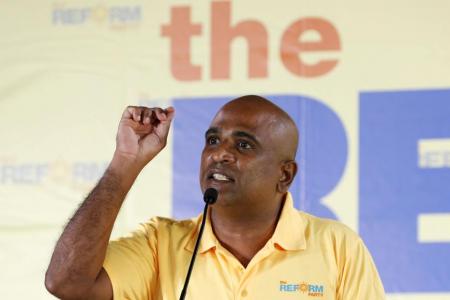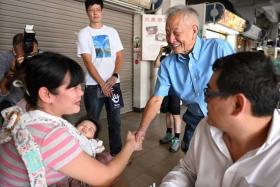M. Ravi files challenge against changes to elected presidency
Elected presidency: Lawyer M. Ravi says the changes deprive citizens of right to stand for public office
Human rights lawyer M. Ravi yesterday filed a constitutional challenge against changes to the elected presidency made last year.
The changes, which Parliament approved last November, tighten the qualifying criteria for candidates, and include a provision to reserve a presidential election for candidates from a racial group that has not been represented in the office for five continuous terms.
Mr Ravi argues that the changes are unconstitutional because they deprive citizens of their right to stand for public office and discriminate on the grounds of ethnicity.
The High Court confirmed that Mr Ravi had filed an originating summons and supporting affidavit.
A spokesman for the Attorney-General's Chambers told The Straits Times that "it will study the papers" filed by Mr Ravi.
Mr Ravi, currently a non-practising lawyer, said on Facebook that he filed the application in his capacity as a private citizen.
His is the second legal challenge related to the elected presidency mounted this month.
On May 5, former presidential candidate Tan Cheng Bock filed a challenge over whether the upcoming presidential election should be a reserved one.
Dr Tan's challenge centres on whether the timing of the reserved election, as set out in the Presidential Elections Act, is consistent with the constitutional amendments.
He says the counting of five terms should start with Mr Ong Teng Cheong.
The Government began with the term of Mr Wee Kim Wee, the first president vested with the powers of the elected presidency. Therefore, the upcoming election has been reserved for candidates from the Malay community.
Unlike Dr Tan, Mr Ravi challenges the entire reserved election mechanism as unconstitutional, he said on Facebook yesterday.
He believes that the elected presidency is not consistent with Article 12(2) of the Constitution.
It states that unless expressly authorised by the Constitution, there shall be no discrimination against Singapore citizens on the ground only of religion, race, descent or place of birth in any law, or in the appointment to any office, or employment under a public authority.
"The right to stand for the elected presidency should be no different from the right to participate in parliamentary elections - all citizens should be equal," he wrote.
"The selection of the elected candidate should be based on merit, all other relevant requirements being fulfilled."
Mr Ravi also contends the amendments run counter to a legal principle called the basic structure doctrine, which he says applies here.
It holds that any constitutional amendment which goes against the basic structure or key tenets of the Constitution is invalid.
Mr Ravi argues that the prohibition on discriminating against citizens by race is a key tenet of the Constitution.
Law dons told The Straits Times that if the cases are not resolved by August, the election - which the Government has said will be held in September - could be postponed. But they added that this is unlikely.
Singapore Management University (SMU) assistant law professor Jack Lee said it is in the interest of all parties to have the applications decided before the election is due to be held, so they may well ask the court for expedited hearing dates.
SMU associate law professor Eugene Tan believes "the court is mindful of the presidential election timeline".
He added: "It will move resolutely and expeditiously so that the election schedule will not be detrimentally affected."
Get The New Paper on your phone with the free TNP app. Download from the Apple App Store or Google Play Store now



